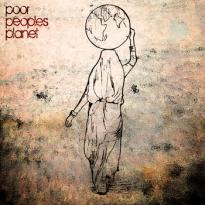Subscribe to Our Newsletter
Special Offer from PM Press
Now more than ever there is a vital need for radical ideas. In the four years since its founding - and on a mere shoestring - PM Press has risen to the formidable challenge of publishing and distributing knowledge and entertainment for the struggles ahead. With over 200 releases to date, they have published an impressive and stimulating array of literature, art, music, politics, and culture.
PM Press is offering readers of Left Turn a 10% discount on every purchase. In addition, they'll donate 10% of each purchase back to Left Turn to support the crucial voices of independent journalism. Simply enter the coupon code: Left Turn when shopping online or mention it when ordering by phone or email.
Click here for their online catalog.
Punjabi Gypsy Hip-Hop Rebellion
 POOR PEOPLES PLANET
POOR PEOPLES PLANET
BY MANDEEP SETHI
http://mandeepsethi.bandcamp.com, 2011
With an unmistakably laid-back West Coast hip-hop sound, 22 year-old Mandeep Sethi brings us Poor Peoples Planet—an album that is dynamic, and often incendiary while maintaining mellow Bay Area vibes. The San Francisco-based Sikh rapper—inspired by the gypsy hip-hop teachings of the crew Xitanos Matematikos, and the history of gypsies from Punjab—flows over meditative and haunting melodies and samples that are not typical for a hip-hop record.
Poor Peoples Planet—Sethi’s third album—is available on iTunes, and at mandeepsethi.bandcamp.com. The first track is “JahKaRa.” It’s a play on the Sikh jakara, originally a revolutionary call-and-response battle cry—a call to arms, in a sense. It is used today to end spiritual services, and in times when the community needs some extra divinely-inspired enthusiasm and courage. This album’s “JahKaRa” begins in Spanish and flows into Sethi welcoming the listener to “the pueblo,” before a series of Punjabi jakaras propels us into the experience of Poor Peoples Planet.
“Guerrilla Tactics (Moving Swiftly)” begins with a sample of the twentieth-century philosopher Jiddu Krishnamurthi, whose speeches are sampled throughout the album. “The outward expression of freedom seems to be extraordinarily important, especially in countries where there is tyranny, dictatorship…” The song explores the question of freedom in our “poor people’s planet,” with a call-and-response chorus hook, bringing to mind the psychology of the film Battle of Algiers. “This is the poor people’s planet/ Guerrilla tactics/ We use them every day/ moving swiftly through the trees/ working every angle/ fucking up the head of my enemies…”
Probably the most anthemic song on the album, “Guerilla Tactics” references the catastrophic effects of big agribusiness’s “Green Revolution” in Punjab—while clearly defining US empire as the enemy. “Ya fuckin’ my people’s farmland/ like seismic shock in Haiti with genetic seeds in hand/ Death to Uncle Sam and all those related/ We movin’ through the matrix faster than you could imagine/ awake from dreamstates to realize I wasn’t nappin’…”
The track “Ragam Virtuoso” goes deeper into Sethi’s Punjabi roots and the struggle of Sikhs: “Singh is the lion who wasn't tamed/ I came from the jungles of Punjab where they reign/ come a come again/ Pain can expose the poetic prose…” Even though I find glorification of the Sikh nationalist project questionable (“Khalistan” is mentioned here), I appreciate Sethi’s lyrical explorations of his own identity, and connecting it to very real struggles in the “homeland.”
Wandering journey
But his lyrics go much beyond the struggles in Punjab. In “Street Poetry,” Sethi rhymes over a mid-tempo track with a couple of acoustic guitars grooving hypnotically. “In Arizona they taxin’ on immigration/ a simple economic move of capitalist hatred/ On stolen land I piss on your rental lease/ prophets puttin’ potion on paper effortlessly/ Can it be the end of me and you/ or could it be the reconstruction of the two…”
Mandeep Sethi’s Poor Peoples Planet takes us on a wandering journey, to better understand oppressed people’s struggles and our desires for freedom.
“We are a people that have been forced out of our land, forced away from our culture, and forced away from our language,” says Sethi. “By nature we are gypsies wandering these plains trying to reconnect with our culture and reclaim what was once ours.”
Musically, the backdrops (produced by X9 of Xitanos Matematikos) for Sethi’s hard-hitting lyrics are interesting and at times esoteric. While I appreciate the mellow and hypnotic vibe created, sometimes I couldn’t help but want a thicker, heavier hip-hop backbeat with a hook I could chant along with. This is not the kind of album you put on at a dance party. But what Sethi doesn’t deliver in party vibe (probably by choice), he definitely delivers in conceptual coherence and freedom-fighting fervor.

